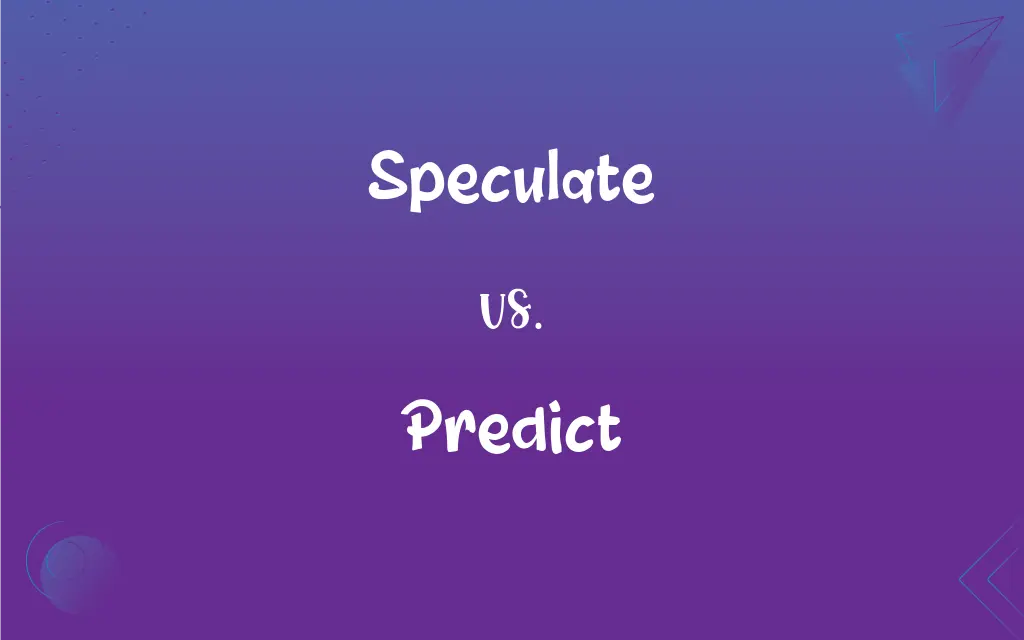Speculate vs. Predict: What's the Difference?
Edited by Aimie Carlson || By Janet White || Updated on October 7, 2023
"Speculate" means to form a theory without firm evidence, while "predict" is to make an informed forecast about future events based on evidence or patterns.

Key Differences
"Speculate" and "predict" are terms that often relate to the estimation of future events. However, "speculate" implies forming a theory or conjecture without having concrete evidence. It denotes a level of uncertainty and is often based on incomplete information. In contrast, "predict" involves making an informed forecast or statement about the future based on available evidence, knowledge, or discernible patterns. Predictions attempt to foresee outcomes and can have a higher degree of reliability compared to speculation.
In investment and financial domains, to "speculate" means to make high-risk decisions, hoping for substantial returns, without having a secure or substantial basis. It implies a degree of gambling and is not necessarily based on sound analysis or concrete evidence. "Predict," on the other hand, refers to making informed, analytical forecasts about market trends, prices, or economic conditions. Predictions in finance are typically grounded in analysis, trends, and available data, aiming to minimize the element of risk involved.
The term "speculate" can also be used more generally to refer to the contemplation or consideration of a subject, pondering over it without reaching a definitive conclusion. It involves thought processes that are more conjectural and theoretical. In contrast, "predict" is more definitive and conclusive, providing a clear statement or assertion about what will happen in the future, often stemming from an analysis of existing conditions or observable trends.
In scientific contexts, to "speculate" is to hypothesize or theorize about phenomena without sufficient data to back up the claims, often leading to the generation of new research questions. "Predict," however, is a key component of the scientific method, where hypotheses are formed to make verifiable predictions that can be tested through experiments and observations. Here, predictions are grounded in existing scientific knowledge and are meant to be tested and potentially falsified.
Comparison Chart
Basis
Theory without firm evidence.
Informed forecast based on evidence.
ADVERTISEMENT
Certainty Level
Uncertain, often high-risk.
Relatively more certain and reliable.
Usage Context
Investments, Theoretical Discussion.
Science, Weather Forecasting, Finance.
Nature
Conjectural and contemplative.
Analytical and definitive.
Objective
To consider possibilities without reaching a conclusion.
To foretell future events or trends.
Speculate and Predict Definitions
Speculate
To form a theory without firm evidence.
Scientists can only speculate about the existence of parallel universes.
ADVERTISEMENT
Predict
The meteorologist was able to predict the upcoming storm.
To make an informed statement about a future outcome.
Speculate
To invest in stocks, property, etc., in the hope of gain but with the risk of loss.
He decided to speculate in the stock market to increase his wealth quickly.
Predict
Based on data, analysts can predict market trends.
To anticipate the occurrence of an event in the future.
Speculate
To make a hypothesis or conjecture about a future event.
We can speculate that the technology of the future will be highly advanced.
Predict
To foretell future events based on patterns or knowledge.
Scientists predict a breakthrough in renewable energy technologies soon.
Speculate
To ponder a subject without reaching a definitive conclusion.
Philosophers often speculate on the nature of existence.
Predict
To declare or indicate in advance.
The economist was able to predict the economic downturn.
Speculate
To make high-risk financial decisions hoping for substantial returns.
Many lost their fortunes by speculating in risky ventures.
Predict
To make a forecast about future conditions or occurrences.
The astrologer claimed to predict people's futures.
Speculate
To engage in a course of reasoning often based on inconclusive evidence; conjecture or theorize.
Predict
To state, tell about, or make known in advance, especially on the basis of special knowledge
Predicted an active hurricane season because of warmer ocean-surface temperatures.
Speculate
To engage in the buying or selling of a commodity with an element of risk on the chance of profit.
Predict
To foretell something.
Speculate
To assume to be true without conclusive evidence
Speculated that high cholesterol was a contributing factor to the patient's health problems.
Predict
(transitive) To make a prediction: to forecast, foretell, or estimate a future event on the basis of knowledge and reasoning; to prophesy a future event on the basis of mystical knowledge or power.
Speculate
To think, meditate or reflect on a subject; to consider, to deliberate or cogitate.
Predict
To imply.
Speculate
(intransitive) To make an inference based on inconclusive evidence; to surmise or conjecture.
Predict
(intransitive) To make predictions.
Speculate
To make a risky trade in the hope of making a profit; to venture or gamble.
Predict
To direct a ranged weapon against a target by means of a predictor.
Speculate
To anticipate which branch of code will be chosen and execute it in advance.
Predict
(obsolete) A prediction.
Speculate
To consider by turning a subject in the mind, and viewing it in its different aspects and relations; to meditate; to contemplate; to theorize; as, to speculate on questions in religion; to speculate on political events.
It is remarkable that persons who speculate the most boldly often conform with the most pefect quietude to the external regulations of society.
Predict
To tell or declare beforehand; to foretell; to prophesy; to presage; as, to predict misfortune; to predict the return of a comet.
Speculate
To view subjects from certain premises given or assumed, and infer conclusions respecting them a priori.
Predict
A prediction.
Speculate
To purchase with the expectation of a contingent advance in value, and a consequent sale at a profit; - often, in a somewhat depreciative sense, of unsound or hazardous transactions; as, to speculate in coffee, in sugar, or in bank stock.
Predict
Make a prediction about; tell in advance;
Call the outcome of an election
Speculate
To consider attentively; as, to speculate the nature of a thing.
Predict
Indicate by signs;
These signs bode bad news
Speculate
To believe especially on uncertain or tentative grounds;
Scientists supposed that large dinosaurs lived in swamps
Speculate
Talk over conjecturally, or review in an idle or casual way and with an element of doubt or without sufficient reason to reach a conclusion;
We were speculating whether the President had to resign after the scandal
Speculate
Reflect deeply on a subject;
I mulled over the events of the afternoon
Philosophers have speculated on the question of God for thousands of years
The scientist must stop to observe and start to excogitate
Speculate
Invest at a risk;
I bought this house not because I want to live in it but to sell it later at a good price, so I am speculating
FAQs
Are predictions always accurate?
No, predictions can be incorrect, but they are typically based on available evidence and patterns.
Can speculation be about philosophical concepts?
Yes, speculation is often used in philosophical discussions to contemplate theoretical concepts.
Can predictions be tested?
Yes, predictions, especially in scientific contexts, are formed to be tested and potentially falsified.
Can one speculate about the past?
Yes, speculation can be about past, present, or future events or conditions without firm evidence.
Is prediction synonymous with forecasting?
Yes, to predict is akin to making a forecast about future events or conditions based on evidence.
Can speculation lead to financial loss?
Yes, speculation in financial markets can lead to substantial financial loss due to its risky nature.
Is speculation a form of gambling?
Speculation in financial contexts can be akin to gambling due to the high-risk, uncertain nature.
Can speculation generate new ideas and theories?
Yes, speculative thinking can lead to the generation of new ideas, theories, and research questions.
Is predicting an integral part of the scientific method?
Yes, making predictions is a crucial step in the scientific method.
Is speculation always based on uncertainty?
Yes, speculation often involves a high degree of uncertainty and risk.
Is speculation more theoretical?
Yes, speculation often involves forming theories or conjectures without definitive evidence.
Do predictions require an analysis of trends?
Typically, predictions involve analyzing trends, patterns, or existing knowledge to forecast future events.
Can predictions be about people’s behavior?
Yes, predictions can be made about people’s future behavior based on psychological studies and observations.
Is speculation a common practice in stock markets?
Yes, speculation is common in stock markets, where investors make high-risk decisions hoping for substantial returns.
Can we predict weather conditions?
Yes, meteorologists use data and models to predict weather conditions.
About Author
Written by
Janet WhiteJanet White has been an esteemed writer and blogger for Difference Wiki. Holding a Master's degree in Science and Medical Journalism from the prestigious Boston University, she has consistently demonstrated her expertise and passion for her field. When she's not immersed in her work, Janet relishes her time exercising, delving into a good book, and cherishing moments with friends and family.
Edited by
Aimie CarlsonAimie Carlson, holding a master's degree in English literature, is a fervent English language enthusiast. She lends her writing talents to Difference Wiki, a prominent website that specializes in comparisons, offering readers insightful analyses that both captivate and inform.































































